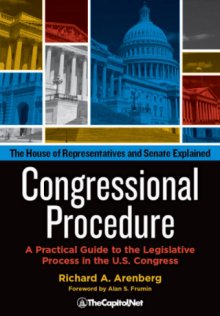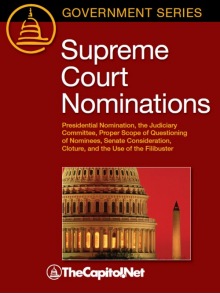Much is being written and reported about a successor to Justice John Paul Stevens. Beyond all the hype and drama associated with the president’s selection of a nominee and the media’s commentary about every conceivable factor involving potential candidates, what will stand out as the center of activity in the weeks and months ahead is the constitutional concept of “advice and consent,” especially the confirmation process and committee hearings that will soon commence on Capitol Hill.
At the heart of this crucial confirmation process will be the Senate Judiciary Committee hearings that are certain to extend for many days, to be followed, if the nomination is reported out of committee, by an up-or-down vote by the full Senate. These committee hearings will likely be scheduled soon after the president announces his nominee. The Senate hearings will be the key to bringing information into the public domain for consideration by the Judiciary Committee and the full Senate. Committee witnesses will include President Barack Obama’s nominee plus others who are in a position to provide information about the nominee’s background, credentials, qualifications, judicial temperament, character and general fitness for service.
“Nominee’s Image Will Be Set by Senate Panel,” by Bill LaForge, Roll Call, April 29, 2010
(Bill LaForge is a lawyer/lobbyist with the Winstead law firm in Washington, D.C., and author of a new book, “Testifying Before Congress,” published by TheCapitol.Net and scheduled for release in mid-2010.)
See also

Supreme Court Nominations
Supreme Court Nominations:
Presidential Nomination, the Judiciary Committee, Proper Scope of Questioning of Nominees, Senate Consideration, Cloture, and the Use of the Filibuster
Compiled by TheCapitol.Net
Authors: Denis Steven Rutkus, Elizabeth Rybicki, Betsy Palmer, Todd Tatelman, Richard S. Beth, Michael Koempel and Judy Schneider
- he procedure for appointing a Supreme Court Justice is provided for by the Constitution in only a few words. The “Appointments Clause” (Article II, Section 2, clause 2) states that the President “shall nominate, and by and with the Advise and Consent of the Senate, shall appoint…Judges of the supreme Court.”
The process of appointing Justices has undergone changes over two centuries, but its most basic feature–the sharing of power between the President and Senate–has remained unchanged. To receive lifetime appointment to the Court, a candidate must first be nominated by the President and then confirmed by the Senate. Although not mentioned in the Constitution, an important role is played midway in the process (after the President selects, but before the Senate considers) by the Senate Judiciary Committee. Since the end of the Civil War, almost every Supreme Court nomination received by the Senate has first been referred to and considered by the Judiciary Committee before being acted on by the Senate as a whole.
This book explores the appointment process–from Presidential announcement, Judiciary Committee investigation, confirmation hearings, vote, and report to the Senate, through Senate debate and vote on the nomination.
2009, 208 pages
ISBN: 1587331586 ISBN 13: 978-1-58733-158-9
Softcover book: $19.95
For more information, see SCOTUSNominations.com




